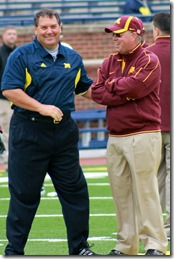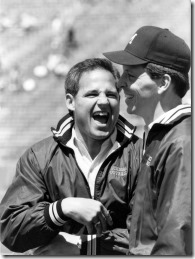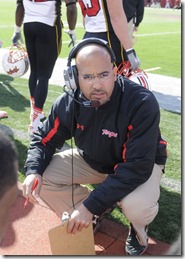Hokepoints: Big Hires Are Evidently a Big Deal

From left: Brady Hoke & Jerry Kill in 2011 [Upchurch], Les Miles and Cam Cameron at the 1989 spring game [Bentley], and James Franklin as a coordinator [courtesy Maryland Athletics]
For HTTV this year I did a study on Big Ten and SEC, and the factors that led to a marked disparity in football success that grew up between them since 1999. One of the most stunning differences I found was in the splashiness of coaching hires.
Someone on the board early this morning asked whether high-profile candidates are such a big deal. The original study answered this emphatically: "Yes!" I thought I'd extend it to the rest of the Power 5 hires since '99 and see if that's still true.
Methodology: I looked at the circumstances at the moment of hiring of every coach (156 total) who started a tenure at a currently Power 5 program since 1999, and put them into one of three (plus one) categories:
- Strong: Stealing another BCS school's coach, or the heir apparent at a power program, or grabbing the year's hottest candidate, or being the school that finally pries a legendary mid-major coach away when everyone else has been trying for years. Universally, these are headline-grabbing guys who probably needed a major monetary incentive to pry them from their last position.
- Average: A guy who was obviously responsible for turning a mid-major into a perennial 9- or 10-win team, a successful NFL or power program coordinator, promoting your own heir apparent (not after firing his boss), etc. These are the hires that you nod at and say "that makes sense" or "B+".
- Cheap: Promoting a coordinator you didn't plan on, grabbing a mid-major coach with mediocre success or success that's not obviously his. Grabbing a washout from the NFL or the Power 5, or a guy who wouldn't have been on any coaching radar except yours.
- (Interim): Don't count unless they were made full.
- These are of course debatable, since they're the opinions of one dude who's been obsessively following college football over this time period, so you can only draw so much. I didn't remember all of them, obviously, but I was able to jog my impressions by reading articles on coaching searches around the time. This is one instance when my life was actually made better by the annual proliferation of "we grade this year's hires" articles from mainstream outlets. When I couldn't decide, I defaulted "average."
- I welcome your suggestions for changes, so long as they fit the criteria (hindsight must be irrelevant).
- The data:
[After the jump: what we learned]
When we break out the levels we get a result not unlike recruiting, where the performance of individuals is highly varied, but the blue chips are more likely to pan out:
| Level | Wins | Losses | Win% | vs Norm |
|---|---|---|---|---|
| Strong | 1780 | 988 | 64% | +3% |
| Average | 1906 | 1428 | 57% | 0% |
| Cheap | 1527 | 1467 | 51% | -3% |
There's an effect; it's not a huge one. Strong hires tend to win at a much higher clip, but they get hired at schools where winning is the norm, and winning almost two thirds of your games at a power five school is below the expectation for grabbing (and paying for) a big-name hire.
However the spread is significant. There is a trend, and if money isn't a big deal (or you're the kind of school who'll pay top dollar for a hire you could make on the cheap anyway) then the big name is absolutely the way to go. You can see why when you chart the hires of the power conferences in this time:
| Conf | Coaches | Strong | Average | Cheap |
|---|---|---|---|---|
| SEC | 37 | 23 | 9 | 5 |
| PacXII | 31 | 11 | 13 | 7 |
| Big XII | 21 | 5 | 8 | 8 |
| Big Ten | 30 | 4 | 9 | 17 |
| ACC | 34 | 4 | 17 | 13 |
| Ind | 3 | 2 | 1 | - |
| Total | 156 | 48 | 58 | 50 |
The conferences that emphasize big hires have been getting better; those who don't have fallen behind. The Big Ten's four headliners were John L. Smith (stolen from Louisville for a lot of money), Rich Rodriguez, Urban Meyer, and James Franklin. It would seem like just a 50% hit rate, worse than that if you're not sold on Franklin, or perhaps better than that if you're one of those people who wears Arizona undergarments to Michigan games.
One common thread with Smith and RR was the chorus of talk radio-level analysis singing "The spread will never work in the Big Ten!" on the way in, and on the way out, despite defensive struggles being the true culprit for their failures. On the micro level, there are all sorts of reasons why the big guys failed, and often it's weird things like culture non-fits, that cause it.
Big School Comparisons
Last thing I did was to break out the 36 hires made in this time by the 16 power schools that should have a similar kind of budget and recruiting cachet as the job at Michigan. They are: OSU, Bama, ND, Oklahoma, USC, Nebraska, Texas, PSU, Tennessee, FSU, Georgia, LSU, Miami (YTM), Auburn, and Florida.
Strong: 21 hires, among which four are Urban Meyer and Nick Saban. The other big successes relative to their program norms were Malzahn, Les Miles, Pete Carroll, Mark Richt, Bob Stoops, and Tuberville. Gene Chizik and Brian Kelly have won around the norm for their programs. Franchione and Kiffin (at USC) were somewhat below. Reserving judgment on Butch Jones and the guys hired just this year, only Tyrone Willingham and (sigh) Rich Rodriguez didn't come close to matching program expectations.
Average: 11 hires, and considerably less success. Larry Coker, Jimbo Fisher and Jim Tressel were the only major successes from this group, with Bo Pelini and Ron Zook (at Florida) around their programs' historical averages. Minor disappointments were Al Goden, Muschamp, and Bill O'Brien (who shouldn't be judged against the PSU norm for obvious reasons). Charlie Weiss, Mike Shula and Derek Dooley were disasters.
Cheap: Just four hires and none worked out—going cheap is rare for a program that can afford not to, unless your school is about to be hit with major NCAA violations. The latter explains Randy Shannon (-9%) and Luke Fickell, who registers as an interim for completing a season at OSU that was –29% below expectations. The two unforced errors were Bill Callahan, run out of his job with the Raiders by Charles Woodson's uprising who landed on Nebraska, and Brady Hoke.
November 4th, 2014 at 12:31 PM ^
based upon all the information in the post I'm guessing you put a lot of time into this. Stuff like this is what keeps the blog interesting and keeps me coming back.
November 4th, 2014 at 11:43 AM ^
I'm no statistician, but is a 3% movement on a relatively small dataset enough to be statistically significant?
(seriously, I'm no statistician-- I have no idea if I'm even using the phrase "statistically significant" correctly-- but I know that small effects in small datasets aren't necessarily meaningful)
November 4th, 2014 at 11:52 AM ^
Shouldn't Will Muschamp be classified as a strong hire by your definition? He was the coach in waiting at Texas. He had a promise of a five year contract and had been a candidate for several Power 5 jobs.
Obviously he hasn't worked out, but at the time I believe it was considered a win for Florida to take him away from Texas.
November 4th, 2014 at 12:05 PM ^
Exacty. It was considered a huge hire for Florida at the time and a heck of a coup by Foley to steal Muschamp from Texas.
November 4th, 2014 at 11:54 AM ^
The subjective nature of the Hire quality designations and the marginal differences in win percentages between each category makes this analysis appear to be insignificant
November 4th, 2014 at 12:50 PM ^
A single-factor ANOVA (Analysis of Variance) test on the data (throwing out the Interim group, looking only at the Cheap, Average, and Strong groups) spits out a p-value of 0.14939 when testing against the value "win % +/- program's historical norm"
That's not the strongest of p-values: per most statistical norms, we'd be looking for p-values below 0.1 or below 0.05 to say "yes, I am confident in saying there is a statistically significant difference in the average "win % +/- program's historical norm" among EACH of these 3 groups."
FWIW, the p-value is 0.052069 if one tests 2 groups: "Cheap" and "Average OR Strong". So I think the valid statistical conclusion from this data is: "you are more likely to under-perform vs. your historical norm if you go cheap in hiring your new coach. But there is not a statistically significant difference in performance between hiring an Average Coach or a Strong Coach."
November 7th, 2014 at 9:11 AM ^
Thanks for analysis, love these types of posts. I wasn't questioning the actual analysis, I just thought the categorization method of "Strong", "Weak" and "Average" might have been too subjective and another classification methodology might have been better suited
November 4th, 2014 at 12:00 PM ^
. . . for Coaches, I would say that goes Double for Michigan's next permanent AD.
I say this because my position is that the type of coach we are looking for will be attracted by his relationship with that AD as much if not more so than the mere fact of being Michigan's next Head football coach. The treatment of recent coaches here will be a hindrance unless there is a strong bond with said AD.
November 4th, 2014 at 12:01 PM ^
Hoke was a cheap hire. The only reason he got the job is that he was friends with Brandon and everyone was excited to get a Michigan Man back as HC! Though his salary was more than cheap!
RR was a strong hire but lost too many games and had one of our all time worse defenses in his last two seasons. His offense was great against weak teams but he got crushed by any team that had a good defense!
We need to try for a coach in the good category! I just hope by the end of the NFL season Jim will be sick of coaching in the NFL and will take our job!
November 4th, 2014 at 12:01 PM ^
The most intersting thing I saw was the schools who continue to hire "STRONG" coaches. USC, Alabama, Auburn, LSU, South Carolina and Texas A&M seem to always get the big splash hires. I like that list of teams. Go get Harbaugh!
November 4th, 2014 at 12:07 PM ^
I suspect the best coaches for a Michigan type program are the ones who can either (a) raise a historic 50% or below school by ~20% more wins, or (b) sustain or increase wins at a school with a historic 70-75% winning record (as UM fits in this category).
The names that jumped off the page by these terms are as I expected: Saban, Meyer, Miles, Rodriguez, Pinkel, Stoops, and Kelly.
November 4th, 2014 at 12:14 PM ^
There's a disconnect with the coach-in-waiting hires. Hiring away James Franklin from Maryland is a Strong hire, but hiring away Will Muscham from Texas is average? I'd also argue that locking in Jimbo Fisher who was destined for a big time coaching job was a strong hire on FSU's part, especially if we're counting hiring away a coach-in-waiting.
Also not sure I'd call Walt Harris a strong hire. I know technically Pitt in 2004 was BCS, but he won his only conference championship that year and was ranked 25. That version of the Big East was a stepping stone conference. You treated Big East hires properly when you called Randy Edsall average.
November 4th, 2014 at 12:23 PM ^
Again we're in gray realm: Pitt was a bigger program (ie could afford to pay more) than UConn. Certainly the Big East was slipping over the course of the aughts, but I wouldn't expect Colorado to have such significant advantages over Pittsburgh that it could regularly raid its coaches, while there's enough disparity between UConn and Colorado that we'd consider any successful guy at UConn a candidate for most jobs that pop up.
November 4th, 2014 at 12:46 PM ^
I'm assuming you meant between Pitt and Stanford (where Walt Harris went). I'd say there probably was a disparity. I didn't raise this in my OP, but if my recollection is right, Harris wasn't popular. Wikipedia says he was pushed out at Pitt (I know, wikipedia...). I just don't think there was any sort of groundswell to keep Harris at Pitt, nor even frustration that he was gone.
To me he wasn't a "strong" hire the way you have characterized others.
November 6th, 2014 at 9:22 PM ^
Sent from MGoBlog HD for iPhone & iPad
November 4th, 2014 at 12:11 PM ^
I am just being nitpickey, but when Arkansas hired Smith in 2012 he was on a 1 year interim contract.
November 4th, 2014 at 12:24 PM ^
Interims who made it 1 year (e.g. Fickell at OSU) counted because they technically had their opportunities to win the job permanently.
November 4th, 2014 at 12:32 PM ^
Hello, Seth, I was wondering what is your email and or if you can email me? I have a quick question. My email is [email protected] If you could shoot me a email or comment back with your email that would be great. Just a quick question about advertising. Thanks.
November 4th, 2014 at 3:15 PM ^
is linked to in his signature line
November 4th, 2014 at 12:14 PM ^
Great post Seth, thank you for doing the ground work. In an excercise like this, you look for general trends instead of nitpicking the "data". Your chart comparing the Power 5 hires over the past 15 years sums it all up.
- The SEC, by far, puts it's money where it's mouth is.
- The PAC12 has a few schools that have histroically worked that way and now the remaning schools are starting to follow suit.
- Even with fewer teams, the Big 12 has had much lower turn over and let the big schools get the big names while everyone else tries to get by
- The ACC is average
- Dear God Big Ten, what the hell is wrong with you!!!
November 4th, 2014 at 12:43 PM ^
Need to fix the Spaziani stats. He started in '09 at BC and hence only coached 4 years.
November 4th, 2014 at 1:17 PM ^
November 4th, 2014 at 1:19 PM ^
Bill Callahan should probably be reclassified as average over cheap considering he was coaching in the Super Bowl in 2002 and hired by Nebraska in 2004. Yes he was fired by Al Davis, but who hasn't been. He has never had an issue finding employment coaching and wouldn't consider him in the "wash-out" category.
November 4th, 2014 at 2:08 PM ^
The classification here just simply can't tell us much. Others have pointed out many specific flaws, one that jumps out at me is that Tommy Bowden was considered STRONG while Gary Andersen was considered WEAK -- they're two deviations apart and they had almost the same resume going into their jobs at Clemson and Wisconsin respectively.
Putting these coaches into three bins doesn't tell us much and it would be flawed no matter who is doing the categorizing. I think if you want to measure desirability, you're going to have to show me the money.
Put the coaches average annual salary vs. some sort of 1-2 year running average for power 5 coaches. Irrespective of a few bad decisions by school that would likely tell you a lot more about the perception of a coach's abilities at his time of hiring.
November 4th, 2014 at 6:26 PM ^
Seth how do yo include a chart where you can scroll within the actual page like chart 1? thanks
November 4th, 2014 at 7:55 PM ^
November 4th, 2014 at 6:52 PM ^
All I know is the Miles pic is hilarious. I had no idea who it was at first. Wildman!
And the conclusion to this study is: Harbaw
November 4th, 2014 at 9:29 PM ^
November 4th, 2014 at 11:00 PM ^
Basically, the Jim Romes of the world and all of the other talking heads were laughing, but football people and local people were not.
November 5th, 2014 at 1:11 AM ^
He dominated his level, and did so in the heart of the PSU/OSU recruiting territory, shooing off lots of DI programs for talent he wanted (thanks to lots of extra benefits that PSU couldn't match but that wasn't ever a problem for OSU).
I wasn't laughing at the time. YSU was a power that I wouldn't have wanted Michigan to face.
November 5th, 2014 at 6:57 AM ^
I had a good laugh at this one...
"...if you're one of those people who wears Arizona undergarments to Michigan games."
RR is a good coach, most of us can agree on that, his defensive Coordinator (greg robinson) was absolutely horrible, which didnt help RR. I didnt think RR was a good choice, but it was splashy, and he tried even tho most were against him.



Comments